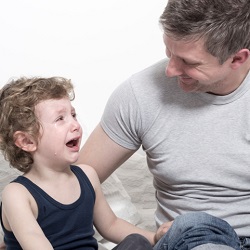 Hearing “I don’t like you!” from your child can hurt, but don’t believe that they really don’t like you. Kids, as young as 2, learn to say “No;” they have their feelings hurt and want to do things their own way. They do not have the cognizance to say, “Mom or Dad, I’m mad because I can’t get my own way at this time, but I understand why you said I can’t do that particular thing.” If only they could!
Hearing “I don’t like you!” from your child can hurt, but don’t believe that they really don’t like you. Kids, as young as 2, learn to say “No;” they have their feelings hurt and want to do things their own way. They do not have the cognizance to say, “Mom or Dad, I’m mad because I can’t get my own way at this time, but I understand why you said I can’t do that particular thing.” If only they could!
On You Tube, I saw a video of a 3-year-old that told his mom that he only liked her when she gave him cookies. She listened and acknowledged what he said. She told him it was okay and that she loved him. He said he loved her too but doesn’t always like her. It was cute. If he was a little older, he probably would have said, “I don’t like what you said.”
If your child shouts, “I don’t like you!” in response to not getting his/her way, acknowledge his/ her feelings, remind him/her that it’s okay to not like the decision and remind your child that you love him/her. Though this may not always go smoothly, the more calm and consistent you are, the better.
When children say, “I don’t like you,” you have an opportunity to help them identify feelings and find more words so they can learn to express themselves verbally.
You might say:
- “It sounds like you are upset with Mommy or Daddy, and that’s okay. Let’s do something else together.” Here, you identify and acknowledge your child’s feelings, allowing these feelings to be felt. You are also saying that there are other things that the two of you could do together. Redirection is a great tool after the acknowledgment of the feelings. It may not always go as smoothly in this scenario, but it does help.
- “I know you may not like what Mommy or Daddy said. What are you mad about?” With this, you acknowledge the feelings and include a question that can help the child formulate thoughts and express how he/she sees it. If your child says, “I don’t want to take a nap. I want to play with my toys,” again, acknowledge his/her feelings and thoughts. You can even say that you agree with him/her that toys are more fun than a nap, but if it’s nap time, explain that the toys will be there when he/she gets up. Proceed to preparation for nap.
Some kids will accept this as sufficient and others won’t. When a child gets more upset or doesn’t like the answer, remain calm and consistent. He/she will be okay. If tantrums become more extreme, continue to remain calm and consistent. It’s difficult, but it is necessary to not give in. You can still acknowledge the feelings briefly, without fully engaging in conversation with your child. Reasoning with a child when he/she has a tantrum is not helpful in decreasing or eliminating the tantrums, in fact, it reinforces them.
You can remind your child that when the nap is done, both of you can play with the toys, go to the park, or do something else.
Remember, kids don’t mean it when they say, “I don’t like you.” It can hurt, but your job as a parent is to raise your child to be able to express the thoughts and feelings he/she has in appropriate ways, be helpful and respectful, and have a strong sense of self-worth.
When you remain calm and consistent as best you can, this will help you both to work through the particular situation and get to having a more fun time easier and faster.
One book that is very helpful is Making Children Mind Without Losing Yours by Dr. Kevin Lehman. Check it out!

The preceding article was solely written by the author named above. Any views and opinions expressed are not necessarily shared by GoodTherapy.org. Questions or concerns about the preceding article can be directed to the author or posted as a comment below.

 'Bad' Kid or 'Bad' Behavior and How It Shapes a Child’s Self-Esteem
'Bad' Kid or 'Bad' Behavior and How It Shapes a Child’s Self-Esteem Why Feeling Anger and Hate Is Good
Why Feeling Anger and Hate Is Good Parenting and the Art of Benign Neglect
Parenting and the Art of Benign Neglect

Please fill out all required fields to submit your message.
Invalid Email Address.
Please confirm that you are human.
Leave a Comment
By commenting you acknowledge acceptance of GoodTherapy.org's Terms and Conditions of Use.